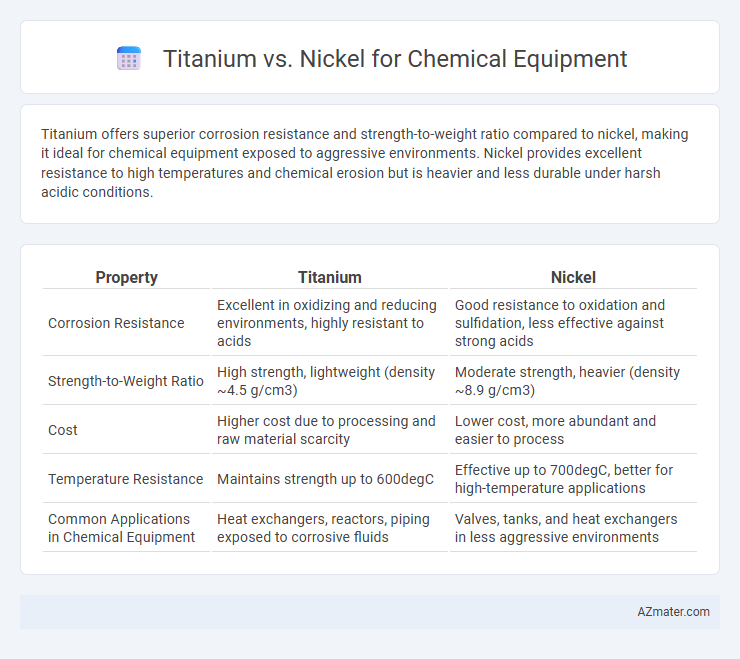Titanium offers superior corrosion resistance and strength-to-weight ratio compared to nickel, making it ideal for chemical equipment exposed to aggressive environments. Nickel provides excellent resistance to high temperatures and chemical erosion but is heavier and less durable under harsh acidic conditions.
Table of Comparison
| Property | Titanium | Nickel |
|---|---|---|
| Corrosion Resistance | Excellent in oxidizing and reducing environments, highly resistant to acids | Good resistance to oxidation and sulfidation, less effective against strong acids |
| Strength-to-Weight Ratio | High strength, lightweight (density ~4.5 g/cm3) | Moderate strength, heavier (density ~8.9 g/cm3) |
| Cost | Higher cost due to processing and raw material scarcity | Lower cost, more abundant and easier to process |
| Temperature Resistance | Maintains strength up to 600degC | Effective up to 700degC, better for high-temperature applications |
| Common Applications in Chemical Equipment | Heat exchangers, reactors, piping exposed to corrosive fluids | Valves, tanks, and heat exchangers in less aggressive environments |
Introduction: The Importance of Material Selection in Chemical Equipment
Material selection in chemical equipment critically impacts corrosion resistance, durability, and overall performance in harsh environments. Titanium offers exceptional resistance to chloride-induced stress corrosion cracking and high strength-to-weight ratio, making it ideal for aggressive chemical processes. Nickel-based alloys provide superior resistance to high-temperature oxidation and sulfide stress cracking, often preferred in high-temperature and sulfur-rich applications.
Overview of Titanium and Nickel Alloys
Titanium alloys exhibit exceptional corrosion resistance, high strength-to-weight ratio, and excellent performance in aggressive chemical environments, making them ideal for chemical equipment exposed to strong acids and high temperatures. Nickel alloys, such as Inconel and Monel, offer superior oxidation resistance, toughness, and stability across a wide range of temperatures, commonly used in reactors, heat exchangers, and piping systems in chemical processing plants. Both materials provide specific advantages in chemical equipment, with titanium favored for lightweight corrosion resistance and nickel alloys chosen for their durability and thermal stability under extreme conditions.
Corrosion Resistance: Titanium vs Nickel
Titanium exhibits superior corrosion resistance compared to nickel, especially in aggressive environments such as seawater, chlorine, and oxidizing acids, due to its stable oxide film formation. Nickel also offers good corrosion resistance but is more susceptible to pitting and crevice corrosion in chloride-rich media. The exceptional resistance of titanium to a wide range of chemicals makes it the preferred choice for chemical equipment exposed to harsh and corrosive substances.
Mechanical Properties Comparison
Titanium exhibits superior strength-to-weight ratio and excellent corrosion resistance, making it ideal for chemical equipment exposed to aggressive environments. Nickel offers higher ductility and toughness, providing better flexibility under mechanical stress but at a higher density. The choice between titanium and nickel depends on the specific mechanical load requirements and corrosion conditions in the chemical processing application.
Temperature and Pressure Performance
Titanium exhibits exceptional corrosion resistance and maintains strength at high temperatures up to 600degC, making it ideal for chemical equipment operating under extreme thermal conditions. Nickel also performs well under high-pressure environments, retaining mechanical integrity above 100 MPa with corrosion resistance in aggressive chemical processes. The choice between titanium and nickel depends on specific temperature and pressure requirements, with titanium favored for higher temperature resilience and nickel preferred for ultra-high pressure applications.
Cost Analysis and Economic Considerations
Titanium offers superior corrosion resistance and durability in chemical equipment but comes with higher initial costs than nickel, which is generally more affordable upfront. The lifecycle cost of titanium can be lower due to reduced maintenance, longer service life, and minimal downtime caused by corrosion-related failures. Economic considerations must weigh the total cost of ownership, factoring in material costs, installation, maintenance, and replacement frequency to determine the most cost-effective choice for specific chemical processing environments.
Fabrication and Machinability
Titanium offers superior corrosion resistance and strength-to-weight ratio compared to nickel, enhancing its suitability for chemical equipment fabrication in aggressive environments. Titanium's machinability, while generally more challenging due to its toughness and low thermal conductivity, benefits from specialized tooling and machining parameters to reduce tool wear and improve surface finish. Nickel, easier to machine with conventional tools, provides excellent corrosion resistance but is denser and less strong, affecting overall equipment weight and durability in fabrication processes.
Industry Applications and Suitability
Titanium's superior corrosion resistance in aggressive chemical environments makes it highly suitable for chemical processing equipment handling chlorides, acids, and oxidizing agents, commonly used in the aerospace, marine, and pulp and paper industries. Nickel alloys excel in high-temperature and high-pressure applications, particularly in petrochemical and power generation industries, due to their strength and resistance to sulfur compounds and caustic media. Choosing between titanium and nickel depends on specific chemical exposure, temperature, and mechanical stress requirements crucial for optimizing equipment longevity and performance.
Environmental and Safety Factors
Titanium offers superior corrosion resistance in aggressive chemical environments compared to nickel, reducing the risk of equipment failure and hazardous leaks. Its biocompatibility and non-toxicity minimize environmental contamination during use and disposal, making it a safer choice for chemical processing applications. Nickel alloys, while durable, may pose higher environmental risks due to potential heavy metal pollution and stricter handling regulations.
Choosing the Right Material: Key Decision Criteria
Selecting between titanium and nickel for chemical equipment hinges on corrosion resistance, mechanical strength, and cost-effectiveness. Titanium excels in resisting a wide range of corrosive environments, especially chlorides and oxidizing agents, with superior strength-to-weight ratio, while nickel alloys offer excellent resistance to reducing acids and high-temperature stability. Evaluating the specific chemical exposure, temperature conditions, and budget constraints ensures optimal material performance and longevity in industrial applications.

Infographic: Titanium vs Nickel for Chemical Equipment
 azmater.com
azmater.com